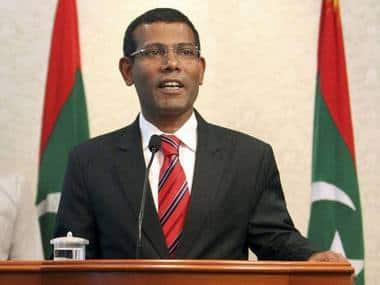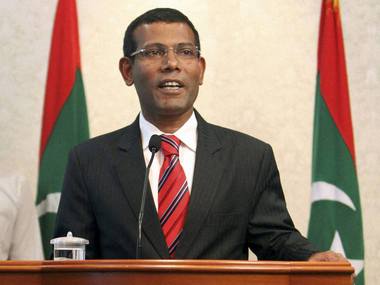[caption id=“attachment_1009603” align=“alignleft” width=“380”]  Nasheed has plenty to offer India if he is elected to power: Reuters image[/caption] India may pat itself on the back as former President of Maldives Mohammed Nasheed has been confirmed as a candidate in the 7 September presidential elections by the Election Commission of Maldives. Nasheed came calling in New Delhi this week on a two-pronged mission: (i) to thank his Indian friends without whose support he won’t have made it to the Presidential race; and (ii) to once again sensitize his Indian interlocutors to prevent “many a slip between the cup and the lip” kind of situation in his case. Let’s be clear about Nasheed’s India mission. He was here primarily centered on the ‘take’ part as he is not in a position to ‘give’ anything to India. His ‘give’ quotient, however, should not be underestimated as the first concrete deliverable he can give to India, particularly to the poll-bound UPA government, is to reverse the executive decision of the Maldives government to terminate the $ 500 million GMR contract for the development and upgradation of the Male International Airport, the single largest Foreign Direct Investment (FDI) Maldives ever got. The GMR deal continues to be the single biggest obsession for the Congress-led UPA government, which if reversed, will inevitably yield the necessary electoral fire-power to the present Indian government. Such a development will allow the UPA government to tell the foreign policy-savvy electorate (though a small number) that Maldives is not lost to India! Besides, if Nasheed, leader of Maldives’ largest party Maldivian Democratic Party (MDP), were to emerge victorious in next month’s presidential election, it will mark business as usual for the UPA government. The Indian government has been reeling under the accusation of botching up its foreign policy with Maldives ever since Nasheed was made to step down from the presidency on 7 February, 2012 under dubious circumstances. Officially, the Indian government’s stand is that it is only for free and fair and transparent presidential elections and it is ready to do business with any Maldivian leader who emerges victorious in the upcoming polls. Nasheed has picked veteran administrator-politician Mustafa Lutfi as his running mate. Lutfi was carefully chosen by Nasheed as he has been part of the cabinet of both former presidents Gayaoom and Nasheed, and also believed to be the brain behind a master plan for the development of higher education in Maldives. Nasheed’s likely strongest rival may well be Abdulla Yamin, candidate of the Progressive Party of Maldives’ (PPM) and half brother of former dictator Abdul Gayoom, who is the founder of the PPM. Yamin has picked Maldivian Home Minister Mohamed Jameel as his running mate. During his India trip, Nasheed met a large number of movers and shakers of the Indian foreign policy establishment. He was the first foreign dignitary to be received by the new Foreign Secretary Sujatha Singh. Nasheed also met other important Indian dramatis personae of the Indian diplomatic and strategic establishment like External Affairs Minister Salman Khurshid and National Security Adviser Shivshankar Menon. But his high moment was when he met Prime Minister Manmohan Singh at the fag-end of his India visit on 3 August. Manmohan Singh told him that he looked forward to free and fair elections in Maldives and stressed on the close relationship with the people of Maldives and India’s desire for seeing a stable and prosperous Maldives. For his part, Nasheed said that he was happy that he could contest the elections without his candidacy being challenged and that he was looking forward to a smooth election process. During his interactions with Khurshid, Nasheed also raised issues relating to visas for Maldivians visiting India and Indian export of aggregates to Maldives which are essential for the construction industry in Maldives. This is an important diplomatic symbolism as it connotes that Nasheed the former President is readying himself for the future. This is clear from the fact that during his various conversations with senior officials, Nasheed harped on the necessity to ensure understanding among political parties in the post-election phase so as to ensure stability in Maldives. Nasheed is central to the Indian game plan in Maldives. It does not, and should not, matter to India who rules Maldives as long as its own strategic interests are not harmed by Male. But it definitely bothers India if its sustained diplomatic efforts of resolving Nasheed-related issues are brought to a naught. This is precisely what has happened. Nasheed has not been debarred from the presidential polls as many, surely Nasheed himself, would have doubted. Maldives’ strategic importance for India cannot be over stated. India has to keep in mind the China and Pakistan factor in the Maldives context. China and Pakistan have steadily increased their strategic footprints in Maldives. Off and on intelligence reports keep coming in warning that jihadist forces are eyeing the strategic location of Maldives and use the country as a transit hub. Fundamentalist Muslims are increasingly asserting themselves in Maldives. Though as of now Maldives is by and large free from the terror menace, it won’t take very long for the Jihadists to set up shop in this tourist paradise. A warning shot was fired by extremists when Maldives was rocked by the first-ever bomb blast in Male on 29 September, 2007 that killed no one but wounded 12 tourists. Since then there have been reports of increasing Wahabisation of Maldives. *The writer is a Firstpost columnist and a strategic analyst. His Twitter handle is @Kishkindha.
If Nasheed, leader of Maldives’ largest party Maldivian Democratic Party (MDP), were to emerge victorious in next month’s presidential election, it will mark business as usual for the UPA government.
Advertisement
End of Article
Written by Rajeev Sharma
Consulting Editor, First Post. Strategic analyst. Political commentator. Twitter handle @Kishkindha. see more


)
)
)
)
)
)
)
)
)



